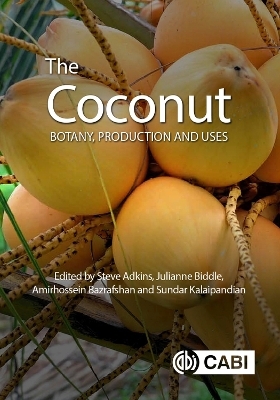
The Coconut
CABI Publishing (Verlag)
978-1-78924-971-2 (ISBN)
The coconut palm (Cocos nucifera L.) is one of the world's most important palms, and contributes significantly to the income and livelihood of many people in tropical countries. Widely referred to as the 'tree of life', coconut has been used as a source of food, drink, oil, medicine, shelter and wood for around 500 years. Every part of the coconut palm can be utilized. The demand for coconut fruit and its products has increased recently as people have become aware of its nutritional and health benefits, especially those of coconut water and virgin coconut oil. This book covers all aspects of coconut including origins and diversity; ecophysiology; production in a changing climate; pests and diseases; harvest and postharvest management; breeding and genetics; as well as the current and future status of coconut as an economic crop. This book is a key resource for researchers and students in horticulture, plant science and agriculture, and those interested in the production of tropical crops, and practitioners in the coconut industry.
Stephen W Adkins (Edited By) Professor Steve Adkins is Professor of Plant Physiology at The University of Queensland (UQ). He obtained a degree in Botany and Zoology from the University of London and a PhD in weed physiology from the University of Reading in England in 1981 and has served as a postdoctoral fellow at the University of Saskatchewan, Saskatoon in Canada (1981-84) and at Murdoch University, Perth, Australia (1984-88). He joined UQ in 1988 and has spent the last 30 years studying various tropical and subtropical crops and pastures, their weeds and the native plant community. Steve has held several leadership roles at UQ since 2010, including Deputy Director and Acting Director in the UQ Centre for Plant Architectural Informatics. In these roles, he has led initiatives that have improved teaching quality and the student experience, instituted guidelines and funding schemes for supporting the career development of RHD students and ECRs, and established several new cross-cutting research networks in collaboration with key external partners. He has served as Treasurer and for two terms as the President of the Asian-Pacific Weed Science Society. His research focus is tropical plants especially coconut, and conservation using ex situ seed banking and tissue culture. He has been a principle investigator and scientific advisor on more than 50 scientific projects worth more than $12 million. He has published more than 180 peer reviewed papers in international journals including Proceedings of the National Academy of Sciences, and supervised more than 50 research higher degree and 40 honours students to completion. Julianne Biddle (Edited By) Dr Julianne Biddle is Director Multilateral Engagement, Research Strategy at Australian Centre for International Agricultural Research (ACIAR) where she develops and manages ACIAR's contribution to multilateral research initiatives. Prior to this she undertook research on coconut and demand-led breeding in Africa at The University of Queensland. Dr Biddle grew up on a beef cattle farm in Central Queensland and has experience working in science, agriculture and science communication. Dr Biddle has a Doctor of Philosophy in Ecology, Evolution and Genetics from the Australian National University (ANU), First Class Honours in Biochemistry and Molecular Biology from the ANU and a Bachelor of Science with Advanced Studies, Biochemistry and Molecular Biology, Cell Biology and Biological Sciences from Griffith University. Dr Biddle is passionate about improving communication between scientists, policy makers and land managers. Amirhossein Bazrafshan (Edited By) Amirhossein Bazrafshan is a PhD Student at the School of Agriculture and Food Science, The University of Queensland, Australia. Prior to this, Mr Bazrafshan worked at the Agricultural Biotechnology Research Insistute Central Region of Iran and studied at the Isfahan University of Technology.
1: An Introduction: Botany, Origin and Diversity 2: Coconut Ecophysiology 3: Management Practices for Coconut Production 4: Coconut Production Under a Changing Climate 5: Pests and Diseases Affecting Coconut 6: Physiological and Nutritional Disorders of Coconut 7: Harvest and Postharvest Management of Coconut 8: Breeding and Genetics for Coconut Improvement 9: Coconut Conservation and Propagation 10: Coconut Biotechnology 11: Coconut Oil: Nutrition and Health 12: Traditional Coconut Products 13: Global Coconut Trade, Economy, and the Value Chain 14: The Future of Coconut as an Economic Crop Worldwide
| Erscheinungsdatum | 23.02.2024 |
|---|---|
| Reihe/Serie | Botany, Production and Uses |
| Co-Autor | E.A. Aguilar |
| Verlagsort | Wallingford |
| Sprache | englisch |
| Maße | 172 x 244 mm |
| Gewicht | 680 g |
| Themenwelt | Naturwissenschaften ► Biologie ► Botanik |
| Weitere Fachgebiete ► Land- / Forstwirtschaft / Fischerei | |
| ISBN-10 | 1-78924-971-6 / 1789249716 |
| ISBN-13 | 978-1-78924-971-2 / 9781789249712 |
| Zustand | Neuware |
| Informationen gemäß Produktsicherheitsverordnung (GPSR) | |
| Haben Sie eine Frage zum Produkt? |
aus dem Bereich


